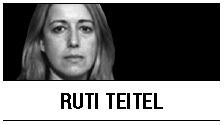NEW YORK ― Barack Obama has promised to send a group of 100 armed United States military personnel to Uganda ― a high-powered posse to help bring to heel (and to justice) the notorious war criminal Joseph Kony, the leader of a brutal rebel group known as the Lord’s Resistance Army. “These forces will act as advisers to partner forces that have the goal of removing from the battlefield Joseph Kony and other senior leadership of the LRA,” Obama wrote in a letter submitted to the leadership of the American congress.

Obama’s foreign policy is often criticized for being reactive or improvisational. But this latest intervention exemplifies the doctrine that he set out in his Nobel acceptance speech in 2009. “Those regimes that break the rules must be held accountable,” and so should their leaders, who are “sworn to protect and defend.” Force might well be necessary to implement the doctrine, because “the world must remember that it was not simply international institutions that brought stability to a post-World War II world.”
Obama can count on at least some bipartisan support at home for the initiative against Kony: a bill requiring U.S. action against the LRA was signed into law in May 2010, with support from Democrats and Republicans in both houses of Congress.
The logic of pursuing Kony closely resembles that of the recent NATO-led intervention in Libya. In that case, operating under a United Nations Security Council resolution, and with broader support, including from the Arab League, the United States and its allies intervened for the ostensible humanitarian goal of preventing the mass killing of civilians at the hands of forces loyal to Colonel Moammar al-Gadhafi.
But the Kony operation is different. Whereas the airstrikes in Libya were mandated to protect civilians from imminent attack, in Kony’s case the sole stated operational objective is his removal from the battlefield, so that he can be brought to justice at the International Criminal Court in The Hague. The ICC indicted Kony and four other LRA commanders in 2005 on charges of war crimes and crimes against humanity.
The LRA, which first emerged in northern Uganda in the late 1980s, is blamed for at least 30,000 deaths and the displacement of two million people. It is notorious for abducting and forcibly recruiting children into its ranks, hacking off its victims’ limbs, mass rape, and sexual enslavement of girls. It is now five years since Kony and the LRA were referred to the ICC ― by Uganda itself, reflecting its own lack of capacity to deal with the rebel movement.
What, then, is the legal basis for what the Obama administration is doing? After all, the U.S. is not a member of the ICC. Moreover, the conflict in Uganda is largely internal, and the U.S. operation is not premised on individual or collective self-defense, unlike recent operations in Afghanistan, Pakistan, and Yemen. And yet Obama has asserted that sending U.S. troops to Uganda is in “the national security and foreign policy interests of the United States.”
Such a conception of national interest can rely only on full acceptance of the U.N.’s “responsibility to protect” doctrine, approved unanimously by the General Assembly in 2005. Accordingly, foreign forces must protect the population from a monster, because Uganda says that it lacks the capacity to do so itself. In the words of Jason Russell, founder of the charity Invisible Children, “It isn’t a political issue. It is a human issue.”
But, as Obama has recognized, the responsibility to protect is also a national-security issue. That recognition reflects a growing trend in international affairs: concerns about human security are displacing ― or, as in the U.S., being subsumed under ― traditional Realpolitik.
At the same time, U.S. troops in Uganda are subject to legal limits ― at a minimum, the Geneva Conventions, whose most important norms include the prohibition of murder, torture, and cruel treatment. Civilians may not be targeted; the principle of proportionality requires the avoidance of excessive force in pursuing a legitimate military objective; and prisoners must be treated humanely. Obama has stated that the advisers will use force only in self-defense. At the same time, obviously, they will be working in close cooperation with Ugandan forces.
But does the Uganda operation, following so closely on the Libya intervention, herald a police role for the U.S. whenever the U.N. or the ICC ― which, lacking their own police force, rely on their members and interstate cooperation ― judges it necessary? Given America’s reluctance to join the ICC (or to bring its own torturers to justice in U.S. courts), such a role would be vulnerable to both international and domestic political attack.
Nevertheless, the extent of U.S. cooperation with the ICC has exceeded even the constructive role that the Obama administration had proposed. Evidently, American policymakers are increasingly receptive to the potential of international criminal justice to undergird the terms of a new form of global engagement.
By Ruti Teitel
Ruti Teitel, a professor of international law at New York Law School and a visiting professor at the London School of Economics, is the author of “Humanity’s Law.” ― Ed.
(Project Syndicate)



![[KH Explains] No more 'Michael' at Kakao Games](http://res.heraldm.com/phpwas/restmb_idxmake.php?idx=645&simg=/content/image/2024/04/28/20240428050183_0.jpg&u=20240428180321)


